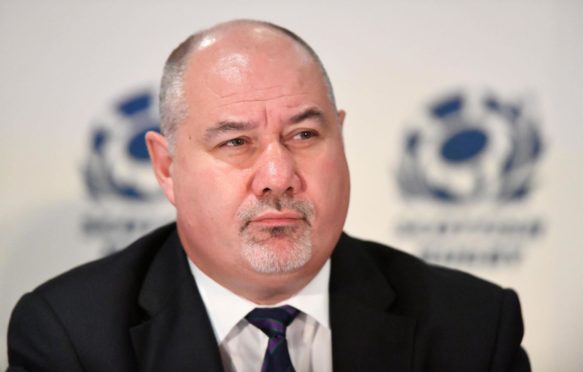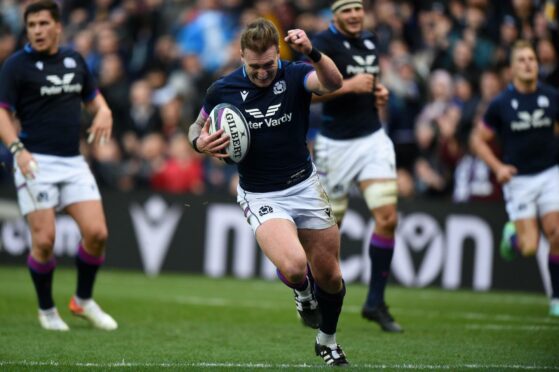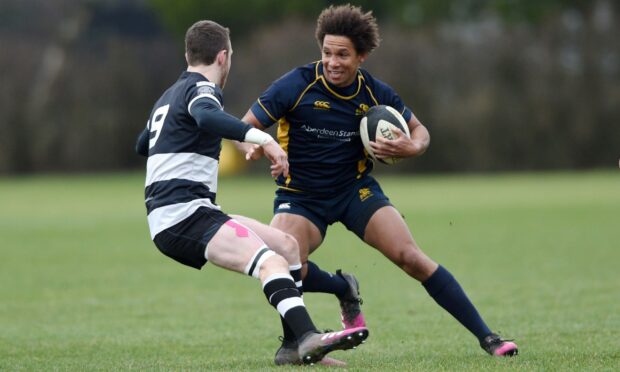Scottish Rugby is back on a strong financial footing following the pandemic but two years have been lost “firefighting” instead of sustaining the growth of the organisation, says chief exceuitve Mark Dodson.
On the eve of the Guinness Six Nations the SRU chief expressed relief that despite “a nasty jolt” with omicron, Murrayfield would be full for the money-spinning tests against England and France.
And despite “a torrid time, along with everyone else” the organisation has come out of the pandemic relatively healthy thanks to government assistance, loyal sponsors and rugby’s supporters, he said.
‘What really hurt us is we lost two years of growth’
“In the financial element, I think we have bounced back pretty well,” he said. “But where it really hurt us is we lost two years, effectively, of growth which would have been sustained from a very strong position.
“We would have kept on growing in the same way we had in the pre-Covid period. I think that’s what damaged us and set us back.
“We would have been much further forward in the women’s game. Further ahead in where the pro teams are. Our grassroots programme would have been put in place would have more time to nourish and be successful.
“It’s the lost opportunities rather than the empirical numbers that has affected us most. We spent those two years firefighting when we would have been driving the business forward at the same or probably quicker rate than previously.”
More club covid support in the coming weeks
We're delighted to have Craignathro Farms onboard as our new sponsor of the Strathie Clan 🏉
Read the full story here https://t.co/zwp6CaS7x3@Strathmore_RFC @strathmore_cc @BrechinRugby @angusalive @tesconews @silverbacksRL pic.twitter.com/v4nUtUKC0q— Strathmore Community Rugby Trust (@StrathCommTrust) January 12, 2022
The £20 million from the Scottish Government was the chief support, and the £5 million of it designated for community rugby will shortly start to be distributed at £1m a year over five years.
“The £15m as a grant was to go to repairing the balance sheet from the damage which was caused having any income from the Six Nations and beyond,” he said.
“The £5m, we have been very clear, is going at £1m per year to the clubs directly through the growth and participation fund. In two or three weeks’ time we are going to be opening that process so clubs can apply for the £1m on offer this year.
“We’ve already directed unprecedented levels of investment into the grassroots game.”
But it’s still too early to tell the detrimental effect on playing numbers caused by the pandemic, he said.
“Playing numbers were a problem for us pre-Covid and they will be a problem for us post-Covid,” he said.
“We are working really hard at schools and club level to attract people back to the game. Also to keep people in the game once they’ve retired, either in a coaching capacity as volunteers.
“Retention and participation is a huge part of the post-Covid era. We are going to spend a lot of money and resource making sure that we actually retain our numbers.
“But it is a global problem for us and other nations. I am not going to make any promises that ‘we will be fine, don’t worry’. I think we would be mistaken to think that player numbers have not been affected by corona.”
‘We would like to see games won in clusters’
Straight to work 💪
Preparing for a big opening fixture vs England #AsOne pic.twitter.com/6USduaFNVe
— Scottish Rugby (@Scotlandteam) January 27, 2022
On the playing side, Dodson agreed that it was time to talk of Scotland winning the Six Nations.
“We want to see progress,” he said. “We played incredibly well last year and didn’t end up in the position our performances deserved.
“I think we have the ability to be competitive in every game. We would like to see games being won in clusters.
“Gregor (Townsend) said at the press conference yesterday that he goes into these tournaments looking to win.
“The squad depth is the greatest in my time here. Many say that this is the strongest squad we’ve been able to put on the park in a generation. Our expectations are high.”
A third pro team remains a “strategic target” rather than one with any timescale. But the chief executive envisages an expansion of the semi-pro Super6 competition to 7 or even 8 teams this year.
“I think the tournament itself has proved itself to be a far higher standard of rugby (at the club level),” he said.
“We’ve been talking to London Scottish about the potential of them coming into the competition. They’re having conversations with the RFU which will take time. They probably won’t join a Super7 or 8 in the short term.
“When the Six Nations finishes we’ll be starting to focus on expanding the league. There are places in the country where there is a gap for having a Super7 or Super8 team.”
Aberdeen a target for attention
Aberdeen and Dundee have been mooted as two possible sites. The Granite City is a particular target for attention, he said.
“We’ve talked long and hard with people like Gordon Thomson on our council and to stakeholders in Aberdeen on what we can do there,” added Dodson.
“I’m sure it’s an area that will come under discussion. There’s also the Glasgow area, the Midlands around Dundee.
“Regardless of where the franchise are, we’re going to have to look at Aberdeen from a rugby development point of view.”


